
Midwestern cuisine is a regional cuisine of the American Midwest. It draws its culinary roots most significantly from the cuisines of Central, Northern and Eastern Europe, and Native North America, and is influenced by regionally and locally grown foodstuffs and cultural diversity.
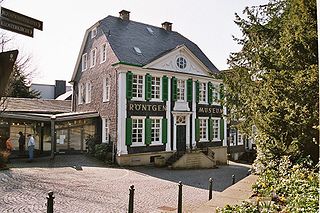
Remscheid is a city in North Rhine-Westphalia, Germany. It is, after Wuppertal and Solingen, the third-largest municipality in Bergisches Land, being located on the northern edge of the region, on the south side of the Ruhr area.
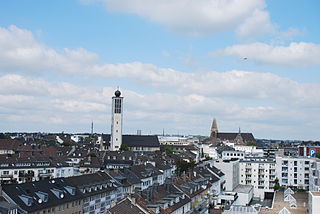
Solingen is a city in North Rhine-Westphalia, Germany. It is located some 25 km east of Düsseldorf along the northern edge of the region called Bergisches Land, south of the Ruhr area, and, with a 2009 population of 161,366, is after Wuppertal the second-largest city in the Bergisches Land. It is a member of the regional authority of the Rhineland.

The Bergisches Land is a low mountain range in the state of North Rhine-Westphalia, Germany, east of the Rhine and south of the Ruhr. The landscape is shaped by woods, meadows, rivers and creeks and contains over twenty artificial lakes. Wuppertal is the biggest town, while the southern part has economic and socio-cultural ties to Cologne. Wuppertal and the neighbouring cities of Remscheid and Solingen form the Bergisches Städtedreieck.
The Rheinisch-Bergische Kreis is a Kreis (district) in the Cologne Bonn Region of North Rhine-Westphalia, Germany. Neighboring districts are Kreis Mettman, Oberbergischer Kreis and Rhein-Sieg, and the district-free cities Cologne, Leverkusen, Solingen and Remscheid.

The Wupper is a right tributary of the Rhine in the state of North Rhine-Westphalia, Germany. Rising near Marienheide in western Sauerland it runs through the mountainous region of the Bergisches Land in Berg County and enters the Rhine at Leverkusen, south of Düsseldorf. Its upper course is called the Wipper. Both names are related to "weave", and refer to the twisting course.
Wüsthof is a knife-maker based in Solingen, Germany. Family owned for seven generations, the company's main products are mid-priced to high-end kitchen knives for domestic and professional use. Wüsthof is one of the leading manufacturers of chef's knives.
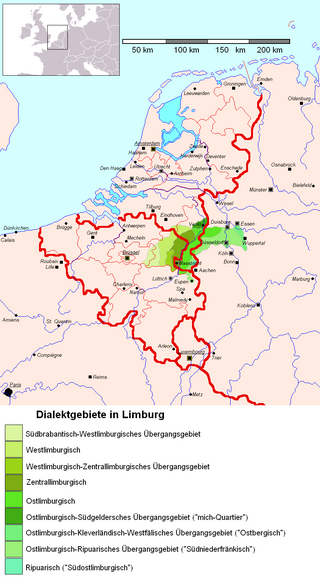
Bergish is a collective name for a group of West Germanic dialects spoken in the Bergisches Land region east of the Rhine in western Germany. The name is commonly used among its speakers, but is not of much linguistic relevance, because the varieties belong to several quite distinct groups inside the continental West Germanic dialect continuum. As usual inside a dialect continuum, neighbouring varieties have a high degree mutual intelligibility and share many similarities while the two more distant ones may be completely mutually unintelligible and considerably different. Therefore, speakers usually perceive the differences in their immediate neighbourhood as merely dialectal oddities of an otherwise larger, solid group or language that they are all part of, such as "Bergish". Bergish is itself commonly classified as a form of "Rhinelandic", which in turn is part of German. Bergish in a strict sense is the eastmost part of the Limburgish language group, which extends far beyond the rivers Rhine and Maas into the Netherlands and Belgium. Bergish in a strict sense is located in the North West. It combines Low Franconian properties with some Ripuarian properties and is seen as a transitory dialect between them in the dialect continuum of Dutch and German. The Bergish varieties in the northern areas are also referred to as parts of Meuse-Rhenish, which exclusively refers to the Low Franconian varieties, that are Limburgish including Bergish.
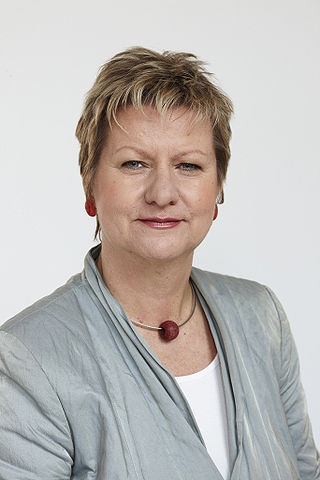
Sylvia Löhrmann is a German politician of the Green Party.

The Wuppertal-Oberbarmen–Solingen railway is a line in the Bergisches Land in the German state of North Rhine-Westphalia, which connects the three Bergisch cities of Wuppertal, Remscheid and Solingen. It is classified as a main line and is double track and non-electrified.

Remscheid Hauptbahnhof is a railway station in the Bergisch city of Remscheid in the German state of North Rhine-Westphalia. It is located in Willy-Brandt-Platz near central Remscheid and is classified by Deutsche Bahn as a category 5 station. Remscheid and Gevelsberg Hauptbahnhof are the only Hauptbahnhof stations in Germany to be served only by S-Bahn trains.

The Wuppertal-Oberbarmen–Opladen railway was a line built by the Bergisch-Märkische Railway Company in the Bergisches Land of the German state of North Rhine-Westphalia, running from Wuppertal via Remscheid-Lennep, Bergisch Born and Wermelskirchen to Opladen.

Wuppertal-Ronsdorf station is a station on the Wuppertal-Oberbarmen–Solingen railway in the German state of North Rhine-Westphalia. It is classified by Deutsche Bahn as a category 5 station. It is unusual in that it was once connected to lines with three different gauges.

Remscheid-Lüttringhausen station is a station on the Wuppertal-Oberbarmen–Solingen railway in Lüttringhausen in the German state of North Rhine Westphalia. It is served by line S 7 of the Rhine-Ruhr S-Bahn.

Ralph Tepel born 1964 in Celle, Lower Saxony, Germany is a German artist, working now for more than 25 years as a fine art photographer, painter, sculptor and last but not least as a sound performance artist.

The Unterburg trolleybus turntable is a disused turntable for trolleybuses in the Solingen district Burg an der Wupper. The facility was regularly used by trolleybus line 683, operated by the Stadtwerke Solingen (SWS), until 15 November 2009, but is preserved in working condition.
Saskia Wummelsdorf Fischer is a German female badminton player. She has competed in the 1997, 2005, 2009 and 2013 Summer Deaflympics.
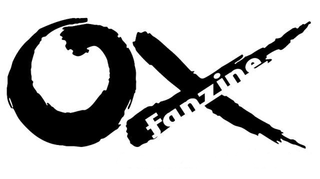
Ox-Fanzine is a monthly punk zine from Solingen, Germany, founded in 1988. It is edited by Joachim Hiller and has had many contributors. Besides its focus on punk subculture, it also covers similar genres, reviews of comics, books and films, and has included serial novels by authors such as Klaus N. Frick.
Instana is a German-American software firm based in Solingen as well as Chicago and San Francisco. It specialises in developing application performance management (APM) software.

Bettina Heinen-Ayech was a German painter. She became known for her colorful landscape views of Algeria.
















